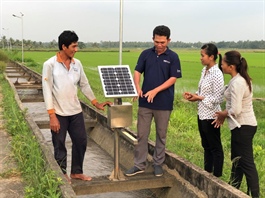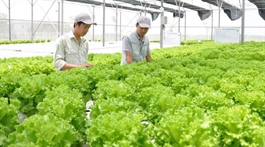Uplift in processed fruit and veg sector
Uplift in processed fruit and veg sector
Processed fruit and vegetables are making up a growing percentage of fruit and vegetable exports, leading to potential for increased investment in the sector.

According to the Agency of Foreign Trade (Ministry of Industry and Trade), exports from Vietnam's fruit and vegetable sector in 2022 were seriously impacted by China's pandemic strategy and totalled just $3.34 billion, a decrease of over 6 per cent on-year. According to analysts, however, the structure of Vietnam's fruit and vegetable exports has undergone favourable adjustments, with the share of processed goods growing substantially.
The $3.34 billion in exports comprised approximately $2.3 billion of fresh and frozen products and just over $1 billion in processed fruit and vegetables, surpassing that mark for the very first time. This has provided impetus to invest in strategically designed and certified processing factories and growing areas in order to quickly achieve the $2 billion export goal.
The growth rate of processed fruits and vegetables may be in part due to the increasing number of Vietnamese goods that are satisfying the stringent standards of the US, European Union, Japanese, and Korean markets. It is anticipated that this pattern will continue in the future as more Vietnamese businesses invest in fruit and vegetable processing factories.
Investments in deep processing increase the value of agricultural goods in Vietnam, but this is also a vulnerability of the agricultural sector. The Ministry of Agriculture and Rural Development (MARD) estimates that Vietnam produces over 30 million metric tonnes (MT) of fruits and vegetables annually, but less than 20 per cent gets processed.
According to the MARD, the nation as a whole has 153 fruit and vegetable processing facilities that handle over 30 million MT of vegetable products annually. Therefore, it is necessary to boost investment in processing plants and integrate them into production chains to keep up with global market sentiment.
This means that more than 70 per cent of exported fruits and vegetables are still in the raw or preliminary preservation stage. Although the nutritional requirements of people throughout the globe, and in Europe in particular, are shifting towards processed fruit and vegetables.
According to the Netherlands' Center for the Promotion of Imports from Developing Countries, European imports of processed fruit and vegetables accounted for 45 per cent of worldwide imports in 2020. This explains why Vietnam's fruit and vegetable exports only make up a small fraction of its total export revenue.
As a promising indicator of future growth, an increasing number of significant companies have committed hundreds of millions of dollars to construct processing facilities with contemporary technology. These factories guarantee that items produced for overseas markets fulfil their stringent requirements.
In particular, it is anticipated that Dong Giao Foodstuff's Doveco Son La Factory, with a capacity of 52,000 MT of goods per year, will be put into operation later this quarter, contributing to an increase in revenue compared to the more than $100 million attained in 2022.
Nonetheless, investment in a modern processing facility and cutting-edge equipment must be paired with a variety of other elements. It is not rare for manufacturing plants to be operating at only 60 per cent capacity, either because the plant is not conveniently located near a sufficient raw material source or because the raw materials do not adhere to requirements.
Nguyen Manh Hung, general director of Nafoods Group, said, "If raw materials are plentiful, that's great for the processing facility, but the quality of commodities may not be consistent, or high levels of pesticide residuals remain in the product. This results in post-processed commodities that can only be supplied to low-value markets".
Hung stated that these deficiencies must be remedied swiftly in order to advance towards a more sophisticated manufacturing and export business that generates greater actual value.
According to European Statistics, the global market for processed fruit and vegetables is expected to reach $392 billion by 2025. Vietnam mostly exports fresh fruit to the Chinese market. Exports to the markets of the European Union, the United States, Japan, and Australia are still restricted since the preservation stage has not yet satisfied their standards and the expense of air transport makes it difficult to compete.

























